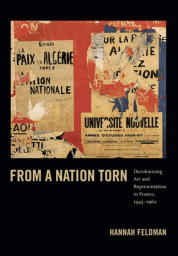
Hannah Feldman is a historian and theorist of contemporary art and visuality, urban space, and decolonization/decoloniality. This last interest means she is equally invested in understanding the presupposition of secularism (and all its effects) as a problem of and for contemporary critical praxis. Her first book, From a Nation Torn: Decolonizing Art and Representation in France, revises accounts of mid-century French aesthetics to argue for the centrality of decolonization to the contemporaneous theorization of urban space, art, photography, the public, spectacle, and the very project of writing history. Research for this project was supported by grants and fellowships from the Getty Research Institute, the Samuel H. Kress Foundation, the Alice Kaplan Institute for the Humanities at Northwestern University, the Andrew W. Mellon Art History Publication Initiative, and the Canadian Center for Architecture. Reviewed in more than a dozen national and international publications, including Art Journal, Art Bulletin, and The American Historical Review, the book is credited for having shifted the frame of focus for art historical periodization and theorization, and for paving the way for an art historical embrace of decolonization as a structural and not just canonical problem.
In addition to curating a major retrospective of the Lebanese-born artist Huguette Caland for the Reina Sofia (2025) and a second exhibition at the Arts Club of Chicago (2025), Feldman is presently completing three related research projects, all of which draw strength from two years of advanced study in both the anthropology of secularism and governmentality and Middle Eastern Studies at the University of Chicago under the aegis of an Andrew Mellon New Directions Fellowship subsequent to the publication of her first book, as well as sabbatical leaves at the INHA in Paris. These are: an analysis of contemporary photography in the Levantine Middle East seen and read through the semiotic framework of “other tongues;” a study of the development of aesthetic theories and practice in the first few years of Algerian political sovereignty beginning in 1962; and a speculative, book-length “letter” to the artist Walid Raad. A semi-fictional account of the color pink and the notion of disappearance is also in development. Invested in alternative and creative forms of art historical writing and scholarly presentation as urgent modes of critical praxis, she is also the co-editor, with Rachel Haidu, of Touching Paper: Writing Towards Art, Love and the Weather (under contract with Duke University Press). She has authored numerous articles about contemporary art and visual culture in publications including Artforum, Art Journal, Frieze, nka: Journal of Contemporary African Art, October, and Third Text, as well as in exhibition catalogues published by institutions including the Luma Foundation, the Museo Nacional Centro de Arte Reina Sofía, the Kunsthalle Zürich, Portikus, Museet for Samtidskunst, the Whitney Museum of American Art, and the Renaissance Society. Her work has been translated into Euskara, French, German, Polish, and Spanish, and she is on the Advisory Board for the Sheikh Zayed Series for the Visual Arts at the American University of Beirut Press. She has served on the editorial board of the Art Journal (and as its chair), and was, for years, a Senior Scholar in Residence at the Core Program at the Museum of Fine Arts in Houston.
Feldman’s courses range from introductory surveys of art since the 1960s to advanced undergraduate lectures and graduate seminars that consider the intersection of art and urban space in sites of postcolonial and neocolonial conflict; art and protest; art and cinema; participatory aesthetic practices; theories of space and time; decoloniality; solidarity; theories and models of photographic practice beyond the Euro-American imagination; modernism and postmodernism; and, especially, art in and about the Middle East and North Africa.
Feldman has mentored successful PhD dissertations about topics ranging from, for example, the art of the Black Panthers; migration in contemporary art in Morocco; universalism and painting in Iranian art in the decades prior to the Iranian Revolution; transnational protest art during the Vietnam-American war; collective and sociological art practices in post-1968 France; the art of the Lebanese Civil War; contemporary aesthetics in North and South Korea; concrete architecture in post-1968 France; science and visuality in the American post-WWII period; art and protest in Palestinian art; and queer aesthetics in late-20th century Germany.
Feldman received her PhD from Columbia University, and her AB from Harvard University before that. In between she was a fellow at the Whitney Independent Study Program where she first wet her feet in art historical waters by co-curating an exhibition at the Whitney called “The Subject of Rape.” Prior to joining Penn, she taught at Northwestern University as faculty in Art History with appointments in Comparative Literary Studies as well as Middle Eastern and North African Studies.


